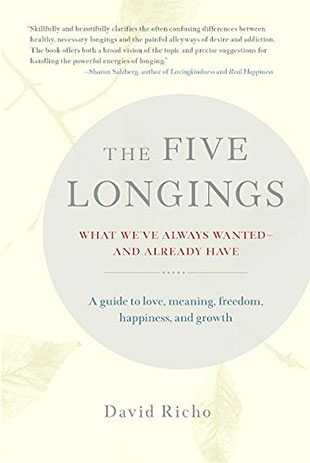"But one man lived the pilgrim soul in you . . . "
— William Butler Yeats, "When You Are Old"
"The recent interest in the Camino de Santiago pilgrimage route illustrates a longing people have had for centuries. The Camino is a path to the shrine of Santiago de Compostela in northern Spain. Since medieval times, people have made the pilgrimage to the cathedral there. Buddhism and most religions also recommend pilgrimages as spiritual practices. For instance, in Islam every believer is called to make at least one pilgrimage to Mecca in his or her lifetime. What is the basis for religious endorsements of pilgrimages? It is precisely our universal human longing for growth, for becoming more than we were by going father than we ever dared. The longing for growth is shown in this instance, by walking from where we are to where something transformative awaits us. The destination of any pilgrimage is a new horizon, the one we glimpse and are drawn to.
"We begin with a distinction. As we have observed, desire is for what is known and attainable. A longing is for what is mysterious and not fully attainable. We desire to go on a pilgrimage. We long for the wonderful and as-yet-unknown inner adventures that await us on the path and upon our arrival at our destination. For instance, when we reach the shrine, we might realize that we are not looking at a saint above us but looking into a mirror of our own always-sacred soul. Our longing for self-realization, the combination of all five longings, is the treasure we have then found on the pilgrimage. This is something we could not have known before we left home. Our desire contained the longing like a pearl in an oyster or a diamond in a mine.
"Throughout the ages people have wanted to take to the open road. The pilgrim path is a metaphor for the spiritual path. We notice it is like going on a retreat, the sitting version of a pilgrimage. The motivations for both inner and outer pilgrimages have the momentum of a journey:
- "Something in us just wants to do it and we don't fully know why.
- "We are tired of our life routine and want a whole new experience and hope to find new perspective.
- "We are seeking the answer to a taxing question or conundrum. We are confused and want some clarity.
- "We are trying to discern our true calling.
- "We are wounded interiorly or have an illness and we seek a healing.
- "We have a devotion to the saint represented in the shrine and are going there to pray.
- "We have something to be enormously grateful for and the pilgrimage is a way of showing thanks.
- "We are making atonement for something – a common medieval motivation.
- "We want to activate all five of our longings in a spiritual setting: We will feel the loving companionship of fellow pilgrims. We will find meaning in the experience from the first step to the last. We will feel free and yet have a path to follow. It will be one we choose but one that ancestors have followed too. We will be happy doing this. We will grow from the experience."
"Nature pricks them with such passion
That folk long to go on pilgrimages
To tread new shores . . . to seek shrines far away."
— Geoffrey Chaucer, General Prologue, The Canterbury Tales
